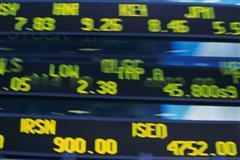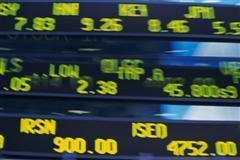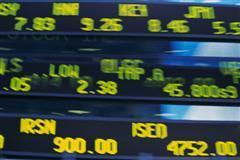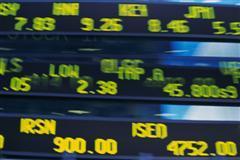| Home | About | Archives | RSS Feed |

@theMarket: Marking Time
This coming week will be a humdinger for the markets. The Federal Reserve is expected to begin a second round of quantitative easing and voters will deliver their verdict on the economy in mid-term elections. Both events will have ramifications for investors and stock markets worldwide.
The Fed's decision to further stimulate the economy via a second round of quantitative easing (QE II) has already been priced into the market, in my opinion, but the impact of the mid-term elections has not. If the Republicans gain a majority in the House and additional seats in the Senate, as many political pundits predict, then the markets have reason to rally in the months, if not weeks ahead.
For me, the question is when, not if, the markets will gain more ground. Stocks (and some commodities) are somewhat overbought right now and looking for an excuse to pull back. Maybe the election results will precipitate a "sell-on-the-news" reaction in the very short term. The question I ask is whether the lame-duck Congress will give investors an added excuse to sell?
Most readers are aware that the Bush tax cuts are scheduled to expire in 2010. Will Congress act to extend those cuts before the end of the year? If it does (by extending the tax cuts for many, if not all, Americans), then the markets could see substantial gains. On the other hand, if nothing is done and the tax cuts are allowed to expire than we may be in for a period of uncertainty.
Since I have been attending Charles Schwab's yearly investor conference in Boston this week, it was a good opportunity to take the pulse of the best and brightest on Wall Street as they shared their views of the market and economy. Clearly, just about everyone I talked to is bullish. Not once did I hear the term "double-dip recession," and for the most part, just about everyone was looking for strong markets between now and at least the second quarter of 2011.
In addition, no one likes bonds, especially U.S. Treasury bonds. "Bubble" was the term most often used when describing the $70 trillion investors have stashed away in the bond market. Most argue that the perceived safety that investors see in bonds is an illusion. The investment team from Gameco Investors Inc. headed by famed value investor Mario Gabelli argued that bonds are "in the ninth inning of a 30-year run" providing holders with little yield, no growth prospects and a mountain of interest rate risk. In addition, "Money markets are also not as safe as you think," said Gabelli.
He points out that the $2.8 trillion in money-market funds has a great deal of dollar risk in the form of depreciation, inflation and debasement, besides offering little in the way of yield or growth.
Currency wars was also a leading topic of discussion with most participants believing the battle between nations to keep their currencies weak will continue. The prognosis for the greenback is more weakness ahead as America attempts to export its way to greater growth. As a result, U.S. companies that export are in vogue, especially technology stocks.
Gold, precious metals and commodities in general was an area of heated arguments, with some dismissing the recent run ups as irresponsible speculation while others read the price moves as a rationale answer to declining currencies and the inevitable rise in inflation that lurks just around the corner.
Emerging markets are once again in favor as an area for long-term investment. Bulls point to the increasing percentage of global GDP (49 percent) represented by these fast-growing economies as opposed to what they consider is an underrepresented share of the world's stock market capitalization (only 31 percent).
In the minus column, financial stocks stood out as an area that won't regain its pre-2008 luster anytime soon, neither will consumer discretionary stocks. In both cases, these sectors suffer from the deleveraging that is under way among American consumers. Banks, whose major business is making loans to customers, will experience low growth since Americans are trying to reduce, not increase, their debt as a percentage of their personal income. Consumers are reducing that debt by cutting back on their discretionary spending.
All in all the tone was upbeat at the conference and it felt that business was beginning to get back to normal after several years of strife. Whether that is a good thing when discussing the financial services sector is a matter of opinion.
Bill Schmick is an independent investor with Berkshire Money Management. (See "About" for more information.) None of the information presented in any of these articles is intended to be and should not be construed as an endorsement of BMM or a solicitation to become a client of BMM. The reader should not assume that any strategies, or specific investments discussed are employed, bought, sold or held by BMM. Direct your inquiries to Bill at 1-888-232-6072 (toll free) or e-mail him at wschmick@fairpoint.net. Visit www.afewdollarsmore.com for more of Bill's insights.
| Tags: recession, currency, bonds, forecast |
@theMarket: Third-Quarter Earnings Reveal Two Economies
 With one quarter of the companies in the S&P 500 already reporting, third quarter earnings have been a positive surprise. Eighty-six percent have exceeded earnings estimates and 67 percent have posted higher revenue numbers. What the numbers don't say is that most of those gains have come from overseas.
With one quarter of the companies in the S&P 500 already reporting, third quarter earnings have been a positive surprise. Eighty-six percent have exceeded earnings estimates and 67 percent have posted higher revenue numbers. What the numbers don't say is that most of those gains have come from overseas.
The revenue number is where we should focus our attention. Higher earnings can be achieved by simply continuing to cut costs (by firing workers, for example). However, looking at the revenue numbers gives us a clear understanding of where the growth is coming from. Not much of it is coming from the home front. A lot of that growth is coming from higher sales in Asia and other emerging markets.
Since the bottom of the recent recession here in America, the majority of firms in the S&P 500 have been exporting their way into profitability. This quarter was no different. Take United Parcel Services; it is one of the companies that investors consider a good barometer of the global economy because it delivers products everywhere. UPS showed a 3.5 percent increase in growth versus last year here at home while their international growth was 13.7 percent. Many other companies are experiencing the same phenomenon.
Clearly, the falling dollar has helped exports as has the increasing strength in emerging market economies, particularly in Asia. And this weekend all eyes will be focused on the latest round of G20 talks in Seoul, where the ongoing battle to "beggar they neighbor" will continue. We can expect currencies to be one of the main topics of conversation since our own U.S. Treasury Secretary Tim Geithner has already fired the first broadside. In an open letter he has asked members to "refrain from exchange rate policies designed to achieve competitive advantage by either weakening their currency or preventing appreciation of undervalued currency."
In last week's column, "The Coming Currency War," I explained how the world's governments are using their currencies to increase exports at the expense of their neighbors. Clearly, U.S. third-quarter earnings underscore how our own policies have aided and abetted U.S. companies in exporting more. This makes Secretary Geithner's request look a bit suspect in my opinion. It will be interesting to see the response of other governments.
I mentioned last week that I was waiting for commodities, specifically gold and silver, to pull back. I expected that pullback to be sharp, and it has been. After hitting a high of $1,380 an ounce, gold dropped as low as $1,317 an ounce in what felt like a blink of the eye. Silver also had a commensurate move downward. As expected, a rise in the dollar was the catalyst for that pullback. Traders will wait until they see the results of this weekend's G20 meet before going back into precious metals or other commodities.
There is always the risk that some new policy initiative could strengthen the dollar and thus continue the commodity sell-off. It could happen, but I wouldn't hold my breath. There are few new policy alternatives on the table in Washington to revive the economy so my bet is that after a brief period of strength, the dollar will resume its decline, gold and other commodities will continue higher and so will the stock market. Under that scenario, we are back to buying the dips. Invest accordingly.
| Tags: currency, global economy, dollar |
@theMarket: QE II Supports the Markets
 No, QE II is not the name of a cruise ship; although it might as well be, given the upward ride it is providing the stock market. The Federal Reserve is expected to launch another quantitative stimulus effort in early November and the markets are rising in anticipation of that event.
No, QE II is not the name of a cruise ship; although it might as well be, given the upward ride it is providing the stock market. The Federal Reserve is expected to launch another quantitative stimulus effort in early November and the markets are rising in anticipation of that event.
On Friday, Fed Chairman Ben Bernanke reiterated that the central bank is ready to move if necessary to stimulate the economy. Investors are assuming it's a question of "when" and not "if" the Fed will move to buy additional U.S. Treasury bonds, mortgage-backed securities and whatever else they decide will provide additional impetus to a slow-growth economy.
In an election year, where the continuing high rate of unemployment and the ongoing housing mess is being blamed on the Democrats, the pressure on the Fed for a QE II must be enormous. Remember, at the end of the day, Bernanke is a political appointee, as are the members of the Fed's governing board. Sure, we would like to think that the Fed is an independent body focused solely on the economic health of America and it is most of the time.
On the other hand, if the president's wishes dovetail with what the Fed perceives to be necessary in helping the economy so much the better.
In my last few market columns, I explained that QE II was a game changer. The Fed, by promising additional stimulus, is providing investors with a "put" on the economy and therefore on the stock market. If the economy continues to grow on its own, the markets will go higher. If the economy falters, the Fed will intervene to fix it and the markets will go higher. What's not to like about that?
The arguments on whether we really do need another stimulus, will QE II really work, and will it add to the potential for more inflation down the road are consuming a forest of newsprint. In the meantime, investors are dumping the dollar (see my latest column "The Coming Currency Wars"), the markets forge steadily higher and commodities of all kinds are on fire.
As readers recall, only a month ago I raised my price target for gold to $1,350 per ounce. We have already surpassed that level and it looks like the yellow metal will hit $1,400 per ounce very soon. I'm going to have to raise my price target again but first I would like to see gold and other commodities pull back.
The dollar is key to any commodity correction. There is an inverse relationship between the dollar and commodities. The dollar may bounce over the next few weeks and if it does, that should cause commodities in general to pull back. Remember too that in the commodity arena, corrections are extremely sharp where prices can drop dramatically in a very short time.
As the S&P 500 Index flirts with the 1,180 level, I would expect a bit of resistance before the bulls make a dash toward the year's highs. The ongoing questions over housing foreclosures that have embroiled most of the banking sector this week has kept a lid on the averages. The next Fed meeting won't be until early November so any potential QEII is still weeks away. The main market moving catalyst we face is this quarter's earnings announcements. So far, company results have been a mixed bag. My advice is to let the markets pull back a bit before committing any more money to this party.
| Tags: Federal Reserve, Bernanke, stimulus |
@theMarket: A September to Remember
 It was a strong September, the best in 70 years, with the Dow up more than 8 percent for the month while the other averages were not far behind. As the third quarter closes, however, the clear winners were precious metals. But it appears that both commodities and stocks have more to run in the weeks ahead.
It was a strong September, the best in 70 years, with the Dow up more than 8 percent for the month while the other averages were not far behind. As the third quarter closes, however, the clear winners were precious metals. But it appears that both commodities and stocks have more to run in the weeks ahead.
At the close of the week, we had a bit of profit taking in stocks as well as commodities, but that was to be expected. As long as the economic numbers continue to come in better than expected, the data will provide support for further upside in these markets.
This week most of that data surprised analysts. Second-quarter GDP growth rate came in at 1.7 percent versus an expected 1.6 percent and was 3.7 percent in the first quarter. The core PCE price index gained 1 percent versus 1.2 percent expected. Consumer spending gained 2.2 percent versus a prior gain of 1.9 percent. The New York "ISM" Index of business was 58.3% while analysts expected 55.6 percent and the initial jobless claims were down by 16,000 to 453,000, which were also better than expected.
Numbers like these cheer investors and help justify why the stock markets are climbing after four months of range-bound trading. I believe that markets can correct in two ways: a sharp, painful decline or a period of consolidation where stocks trade in a range until all the sellers have sold. Given the historical run-up in stocks from March 2009 through April 2010, I had warned investors that a correction was due and a period of marking time should also occur while the economy played catch-up with the gains in the markets. I believe that is exactly what has happened over the last five months.
The 1,150 level on the S&P 500 Index has proven stubborn resistance this week. Every time the bulls assaulted that line in the sand, the bears fought back, driving stocks lower again, but not by much and that is what gives me confidence that the bulls will break through that level at some point
Over in the commodity corner, gold has powered higher hitting its 11th record high in a month, trading at $1,316 an ounce before falling back to regroup. Silver has had an even more spectacular run and traded above $22 an ounce before also falling back. Clearly investors are "buying the dips" in those markets. I agree with that strategy. Buyers beware, however, because all that "feel good" emotion as precious metals hit new highs can quickly turn to fear and panic when (not if) commodities correct. These puppies have had quite a run, so new buyers would be advised to wait for the inevitable sharp but short pullback before buying.
As for the stock market, if we punch through 1,150, the next resistance area for the S&P 500 is around 1,180. Notice, too, that at that level we will have almost re-traced all the losses incurred since the market's April high.
One final note, I won't be writing a column next week since I'm going to Maine for a week of kayaking and hiking with my wife and our dog Titus. I'll miss you.
| Tags: metals, quarter, growth, correction |
@theMarket: The Line in the Sand
 It would seem that a low-volume battle is being fought over that 1,130-1,150 level on the S&P 500. As I expected, the break above 1,130 occurred this week and now the bulls have to defend it while attempting to push up above 1,150.
It would seem that a low-volume battle is being fought over that 1,130-1,150 level on the S&P 500. As I expected, the break above 1,130 occurred this week and now the bulls have to defend it while attempting to push up above 1,150.
Actually, the S&P reached an intra-day high of 1148 this week. That is the highest level since May 18. Readers may recall that the present correction and subsequent trading range in the markets began with a decline in late April from a high of 1,219. Last week, I wrote that the S&P 500 would break above this trading range.
Also last week I raised my price targets on gold (to $1,350 per ounce) and silver ($36 per ounce) as well as other precious metals. If those metals continue to steamroll higher, I may have to bump up my estimates in the weeks ahead. Both metals continued to make new highs after the Federal Reserve on Tuesday said they were ready to increase their quantitative easing measures a second time if the economy continued to slow. Investors obviously are betting that QE II is in the cards because both commodities took off just minutes after the meeting.
"Explain that to me," asked one client over sushi at Shiro's this week.
Quantitative easing, for those who are unfamiliar with the concept, occurs when the Fed buys securities (in this case, Treasury bonds and mortgage-backed securities) in an effort to inject more money (stimulus) into the economy. Of course, more money in the system can mean higher inflation down the road if that money is used to buy goods and services. So far, that has not been the case.
All that money continues to sit on the sidelines, earning next to nothing because the banks and corporations are afraid to spend it. Since market participants discount today's actions into the future, investors are assuming that QEII will happen and, at some point down the road, that money will be spent. That will almost assuredly trigger a higher Inflation rate, so buy gold and silver now in anticipation. Of course, the best laid plans sometime go awry. Since gold and silver, along with other commodities, are generating big returns, most players are buying first and asking whether it's a good move later.
While commodities take center stage, the bulls and the bears stand toe to toe. Between them, is drawn a line in the sand that could determine whether this market rolls over once again and trades down 10 percent, or continues higher, maybe back to the April highs. I'm betting higher for now. What the bears don't understand is that the game has changed. The Fed has basically given investors a "put" on the market. Either the economy continues to grow or the Fed will come in and backstop the economy with QE II.
| Tags: securities, metals, commodities |

